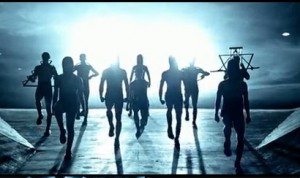 I know summer’s only just begun, but I tend to snarf through good books like they were covered with chocolate sprinkles and laced with crack. One of these days I hope to be hawking my own book, God willing, but until then, I’m content to immerse myself in the genius of others.
I know summer’s only just begun, but I tend to snarf through good books like they were covered with chocolate sprinkles and laced with crack. One of these days I hope to be hawking my own book, God willing, but until then, I’m content to immerse myself in the genius of others.
Of course, it’s a challenge to squeeze in reading time now that I’ve got a day job again, let alone think about writing something with chapters and an actual plotline. I find myself lying about doing laundry just so I can disappear to suck down a few more pages. So I cannot comprehend how Rabbi Zoe Klein managed to scribe Drawing in the Dust—she has a huge L.A. congregation to tend to, not to mention a family, and even if she doesn’t have to do everyone’s laundry, she still must have had to call upon some divine time management skills to craft such a richly-drawn, carefully plotted book.
The rabba’s first novel, Drawing in the Dust, is the story of an unhappy, beautiful archaeologist (there’s a funny interchange in the book about whether she’s “depressed,” “repressed” or “oppressed”) who stumbles upon the remains of a mysterious woman wrapped in arms the prophet Jeremiah. Accompanying the bones of the prophet and his lover is a scroll mirroring the Book of Jeremiah and would be the only documented proof of a woman’s voice in ancient times — if only it wasn’t fiction. (What’s amazing is that Klein herself wrote—practically channeled, really—the scroll of Anatiya while in seminary.)
Highly suspenseful and deeply spiritual, the plot revolves around the scroll and its complicated love story as well as the difficult romance of the non-Jewish archaeologist and an Orthodox historian. Klein does such as artful job of keeping the character’s inner struggle a consistent presence without smashing us over the head with it and still manages to weave in the juxtapositions of the Holy Land’s hidden historical secrets and modern pulse and Arab/Israeli relationships. The descriptions of the archaelogical sites are breathtaking, making place a strong character in itself.
Here’s the author explaining her process:
Is it weird to want her to be my rabbi, mentor and BFF?
 Speaking of mentors, I hope to one day be a part of novelist Jonathan Rabb’s local writing group. A former Columbia political theory professor, Jonathan moved to Savannah a few years ago from NYC (what can we say? It’s a lovely place to raise a family) and now pens his best-selling historical fiction from Ardsley Park. Because I can’t manage to fit in his writing group yet, I’m consoling myself by consuming his Shadow and Light, the second book in a trilogy set in Berlin between the two world wars. (I have yet to the first, Rosa, since it was already checked out of the library, and the third, tentatively titled The Second Son, will be released in early 2011.)
Speaking of mentors, I hope to one day be a part of novelist Jonathan Rabb’s local writing group. A former Columbia political theory professor, Jonathan moved to Savannah a few years ago from NYC (what can we say? It’s a lovely place to raise a family) and now pens his best-selling historical fiction from Ardsley Park. Because I can’t manage to fit in his writing group yet, I’m consoling myself by consuming his Shadow and Light, the second book in a trilogy set in Berlin between the two world wars. (I have yet to the first, Rosa, since it was already checked out of the library, and the third, tentatively titled The Second Son, will be released in early 2011.)
Noirish and impeccably researched (did I mention the man taught at Columbia?), Shadow and Light utilizes the real-life backdrop of Germany’s Weimar Republic and budding film industry to tell a story of murder, conspiracy and decaying social morale. Another example of how place becomes an active character in fiction, Shadow and Light is a history lesson that crackles with Sam Spade-quick dialogue and hundreds of tiny details. I’m not usually one for crime novels or political commentary, but the combination of perfectly-drawn characters (even the anonymous truck driver in the first scene sticks in the brain) and tasteful treatment of the sordid action of Berlin’s underbelly has me burning through pages when I should be attending other responsibilities (how long can you leave sheets in the dryer without molding?)
After Rabb’s book, I’ve got Chris Cleave’s Little Bee beckoning to me from the nightstand. And if anyone’s looking for chuckle-worthy, stereotype-skewering satire, I must recommend Stressed in Scottsdale scribed by my very own mama, Marcia Fine.
Happy reading! What, you say you’re pressed for time? You’re welcome to sneak down to the laundry room with me.


